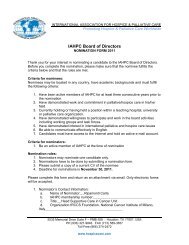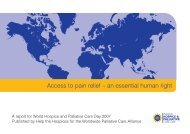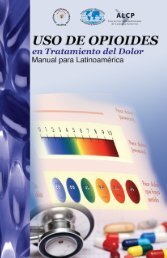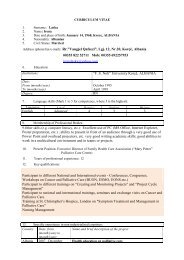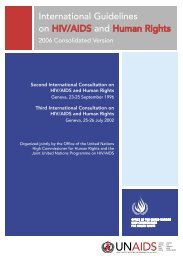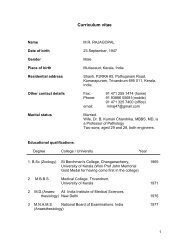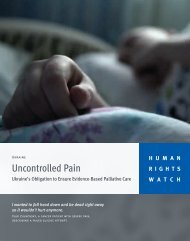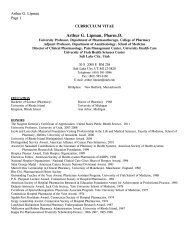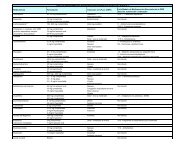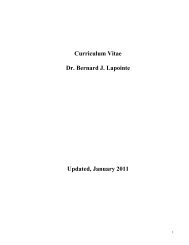INTERIGHTS Bulletin
INTERIGHTS Bulletin
INTERIGHTS Bulletin
You also want an ePaper? Increase the reach of your titles
YUMPU automatically turns print PDFs into web optimized ePapers that Google loves.
180<br />
<strong>INTERIGHTS</strong> <strong>Bulletin</strong><br />
Volume 16 Number 4 2011<br />
International<br />
Law Reports<br />
where they still do not exist, in line with the<br />
recommendations in its concluding observations for<br />
Brazil, adopted on 15 August 2007 (CEDAW/BRA/CO/6).<br />
WOMEN; HEALTH; PRIVATE<br />
LIFE<br />
Violation of Article 8 – right to respect for private and<br />
family life – of the ECHR<br />
Ternovszky v Hungary<br />
Application no. 67545/09, Judgment of the ECtHR, 14<br />
December 2010<br />
In 2009, T, a Hungarian national, became pregnant and<br />
intended to give birth at her home, rather than in a<br />
hospital or a birth home. Hungarian law, at the time,<br />
provided that a health professional who carries out<br />
activities within his or her qualifications without a<br />
license, or carries out such activities in a manner which<br />
is not in compliance with the law or the license, is<br />
punishable with a fine of up to 100,000 Hungarian<br />
forints. Hungarian law further provided that the<br />
Government would determine (but during the relevant<br />
period, the Government had not yet determined) the<br />
professional rules and conditions governing births<br />
outside an institution.<br />
T filed an application with the ECtHR against Hungary<br />
claiming a violation of Article 8 read in conjunction with<br />
Article 14 of the ECHR. T alleged that the lack of<br />
comprehensive legislation on home birth effectively<br />
dissuades health professionals from assisting those<br />
wishing home birth because they run the risk of<br />
conviction for a regulatory offence. T noted that at least<br />
one such prosecution had taken place in recent years. T<br />
claimed that her inability to obtain adequate professional<br />
assistance for a home birth in view of the relevant<br />
Hungarian legislation amounted to discrimination in the<br />
enjoyment of her right to respect for her private life.<br />
The Government argued that the right to selfdetermination<br />
under Article 8 was subject to restrictions<br />
within a wide margin of appreciation by the<br />
Government. The Government argued that there was no<br />
consensus among the European member states as to<br />
how to strike a fair balance between the mother’s right to<br />
give birth at home and the child’s right to life and health<br />
and, in particular, to a safe birth. The Government<br />
further claimed that there was a professional consensus<br />
in Hungary that home birth was less safe than birth in a<br />
healthcare institution. The Government argued further<br />
that home birth was not prohibited and that several<br />
instances of death or serious injury had resulted in<br />
legislation authorising the Government to regulate<br />
births outside a health institution and that the legislation<br />
was currently underway.<br />
The Court held that: (1) the complaint should be<br />
examined under Article 8 alone; (2) the circumstances of<br />
giving birth form part of one’s private life protected<br />
under Article 8; (3) legislation which dissuades health<br />
professionals from providing assistance to a home birth<br />
constitutes an interference with the exercise, by<br />
prospective mothers such as T, of the right to respect for<br />
private life; (4) such interference infringes Article 8 if the<br />
interfering law does not satisfy certain qualitative<br />
requirements such as foreseeability and an absence of<br />
arbitrariness; (5) in the context of home birth, the mother<br />
is entitled to a legal and institutional environment that<br />
enables her choice (including legal certainty that the<br />
choice is lawful and not subject to sanctions), except<br />
where other rights render it necessary to impose<br />
restrictions on that choice; (6) the threat posed to health<br />
professionals by virtue of Hungarian law, the absence of<br />
specific, comprehensive legislation on the matter of<br />
assisting home births, and the actual institution of<br />
proceedings against at least one health professional for<br />
having assisted a home birth, enable the Court to<br />
conclude that the matter of health professionals assisting<br />
home births is surrounded by legal uncertainty prone to<br />
arbitrariness; (7) T made no damages claim; (8) the<br />
Government must pay to T EUR 1,250 plus any tax that<br />
may be chargeable to T in respect of costs and expenses.<br />
WOMEN; LIFE; EQUALITY,<br />
DISABILITY; HEALTH<br />
Violation of Article 7 – prohibition of torture and cruel,<br />
inhuman or degrading treatment or punishment,<br />
Article 17(1) – right to freedom of thought, conscience<br />
and religion and Article 2(3) – obligation on states to<br />
provide a remedy for breaches of rights – in relation to<br />
Articles 3 – the equal right of men and women to the<br />
enjoyment of all civil and political rights in the ICCPR,<br />
7 and 17 – right not to be subjected to arbitrary or<br />
unlawful interference with privacy, family, home or



